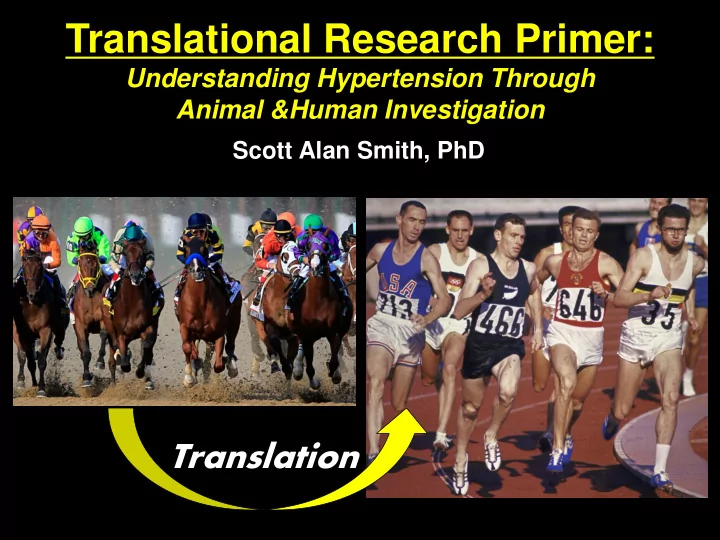

Translational Research Primer: Understanding Hypertension Through Animal &Human Investigation Scott Alan Smith, PhD Translation
*
Translational Research • An effort to build on basic scientific research to create new therapies, medical procedures & diagnostics. • It is the “translation” of basic scientific findings in a laboratory setting into potential treatments for disease.
Translational Research • Step 1: Identify a significant problem • Step 2: Design and perform basic experiments (pre-clinical studies) • Step 3: Design and perform clinical experiments • Step 4: Identify novel targets and/or methods for treatment
Advantages of Using Animal Models • Increased control of experimental conditions • Enhanced isolation of system or process of interest • Mechanistic studies at the cellular & molecular level available • Disease models readily available and/or inducible • Genetic manipulation of models available in some species
Camilla Martin Christian Eriksen Eskild Ebbesen Thomas Bjorn
exampleS Caroline Wozniacki
Hypertension • Disease characterized by chronic high blood pressure • In US, 32% of national population aged 20 or older has hypertension • Major risk factor for development of heart disease, peripheral arterial disease, stroke, heart failure, etc. • Accounts for 13.5% of all deaths • Estimated that 1.5 billion people will suffer from hypertension by 2025 (1/3 of world’s population)
Significant National & Global Health Problem Additional and/or improved strategies are urgently needed to prevent and treat hypertension
Current Strategies to Treat Hypertension • Medications Hold op • Diet (low salt) • Exercise • Bioelectronic Devices
Exercise is Medicine Example
Why Exercise? • Heightens muscle endurance & metabolic efficiency • Enhances heart function • Improves glucose handling & insulin sensitivity • Reduces body weight & fat deposition • Decreases resting blood pressure
Advarsel!!! Warning!!!
The Pressor Response to Static Exercise is Exaggerated in Hypertensive Patients Isometric Handgrip (30% MVC) 100 NT (119/79) * HT (162/112) 80 mm Hg 60 * 40 20 0 D SBP D DBP Kazatani et al. Am J Ther 2: 165-169, 1995
Why? From Smith SA, Mitchell JH & Garry MG. Exp Physiol , 91: 89-102, 2006
The Exercise Pressor Reflex is Overactive in Hypertension 60 WKY * SHR D MAP (mm Hg) 40 20 0 WKY: MAP = 89 ± 8 mm Hg 20 SHR: MAP = 149 ± 5 mm Hg D HR (beats min -1 ) * 15 10 5 0 2.0 1.5 D Tension (kg) WKY SHR 1.0 0.5 0.0 Smith et al. J Physiol 577: 1009-1020, 2006 Mizuno et al. Am J Physiol 300: H968-H977 , 2011
Effects of Blocking Skeletal Muscle Sensory Transmission in Hypertensive Rats SHR X Mizuno et al. Am J Physiol 300: H968-H977 , 2011 Mizuno et al. J Physiol 589: 6191-6204 , 2011
Translation
Intrathecal Fentanyl Infusion
* † ∆ Mean blood pressure (mmHg) HT CTRL * † * † * † HT FENT NT * † Time (min) * P < 0.05 HT CTRL vs . NT † P < 0.05 HT CTRL vs . HT FENT
Treatment Targets Reflex sensory traffic from skeletal muscle • Reduce risk of dangerous cardiovascular event during exercise • Allow exercise of increased intensity & duration • Enhance benefits of exercise training in hypertension
Dietary Interventions Example
Potential Target: Dietary Phosphate (Pi) • Inorganic phosphates (Pi) used as preservatives, flavor enhancers and color stabilizers • Pi additives present in 44% of top selling grocery items • Examples - prepared frozen foods, packaged meats, bread & baked goods, soups, sodas • Estimates suggest US adults consume approximately twice the recommended daily allowance Phosphate Consumption BP?
Collaborative Research Team S. Smith, PHD M. Mizuno, PhD L. Sandon, PhD, RD, LD W. Vonpatanasin, MD Physiologist Physiologist Dietician Cardiologist Pre-Clinical Studies Clinical Studies Translational Research
Pre-Clinical Studies
Pre-Clinical Study Design Males & Females 3 Months Normal Phosphate Diet (0.6% Pi) High Phosphate Diet (1.2% Pi) Baseline MAP (mmHg) Normal Pi = 93 ± 4 High Pi = 120 ± 5
Responses to Exercise Pressor Reflex Activation 0.6% Pi 1.2% Pi From Mizuno et al. Am J Physiol , 311: R39-R48, 2016
Translation
Study Population • Subjects with Prehypertension (BP 120-139/80-89 mmHg) • 50% female • 50% African Americans
Clinical Studies: Randomized Cross-over Design High Pi diet High Pi diet (1,200 mg/d) (1,200 mg/d) Washout Run-in phase Phase 4 wks 4 wks 2 wks 2 wks Low Pi diet Low Pi diet (700 mg/d) (700 mg/d)
Effects of High Pi on Neural control of BP Hand Grip 30% MVC muscle SNA SNA at rest and during handgrip. Measure after 4 weeks of high vs. low Pi diet.
MSNA during Exercise 24 Hour Urine Phosphate = 818 mg 24 Hour Urine Phosphate = 1102 mg
High-Phosphate Diet Induces Exercise Intolerance and Impairs Fatty Acid Metabolism • High Pi consumption decreases treadmill exercise time and spontaneous activity level in mice • High Pi consumption downregulates key genes involved in fatty acid oxidation in mice • In humans, higher serum phosphate levels are associated with decreased physical activity P. Peri-Okonny et al. Circulation 139: 1422-1434, 2019
Treatment Target Phosphate consumption • Dietary phosphate consumption may prove a novel cardiovascular risk factor that can be easily modified for the prevention or treatment of hypertension.
Bioelectronic Devices Example
Response to Renal Injury/Ischemia: Evidence from Animals and Humans SNA SNA SNA SNA SNA Schlaich et al. J Am Coll Cardiol 62: 2031-2045, 2013
Translation
Schlaich et al. J Am Coll Cardiol 62: 2031-2045, 2013
Symplicity HTN-1 Investigators, Hypertension 57: 911-917, 2011
Treatment Target Efferent and Afferent Renal Nerves • Catheter-based renal nerve ablation has been shown to significantly lower systolic and diastolic blood pressure and may prove a viable long-term treatment for hypertension.
Take Home Message Translational research is the KEY to the practical application of basic science discoveries to the development and implementation of new ways to prevent, diagnose and treat disease. 2-Time Olympian 1968 Olympics (Mexico City) – 8 th Single Sculls 1972 Olympics (Munich) – 4 th Double Sculls World Champion 1970 – World Champion, World Rowing Championships
Thank you!!! Lars Ulrich
Recommend
More recommend